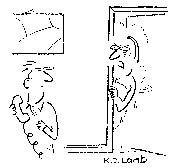This is a strange exercise. It is a commonplace book of quotations from great authors, assembled by the philosopher A. C. Grayling. The extracts from the great books, how- ever, are provided without attribution. Furthermore, they are arranged in numbered ‘verses’, like the divisions of the ‘texts’ in the Bible. The Bible was thus divided for ease of reference when the Rabbis and the Christian Church — in separate exercises, obviously — decided which books should appear in the canon of Scripture. Why Grayling has numbered his collection of quotations is anyone’s guess. The title is slightly cringeworthy. Those who call the Bible ‘the Good Book’ are likely to be the same as those who refer to ‘the Bard’ when they mean Shakespeare.
The book is described as ‘A Secular Bible’, which is baffling. For a start, what is secular about a book composed of, among others, Aristotle, Chaucer, Cicero, Euripides, Herrick, Milton, Seneca, Sophocles, and Vergil to name a few, all of whom were notably religious in outlook? And secondly, who, apart from the Mormons, needs a pretend Bible when there exists a real one? To use the word Bible is to make the rather babyish assumption that freethinkers need some ‘guide to life’, and this, I suspect, is what Grayling is offering.
He is an odd figure, Grayling. Perfectly amiable. Those who live in London, and catch glimpses of him at parties, will sometimes think of Belloc’s lines about ‘Algernon, who won’t admit/The truth about his curious hair’. Voraciously sociable, and a good broadcaster and journalist as well as an academic philosopher, Grayling likes the great freethinkers. He wrote an excellent book about Hazlitt. For some reason he has an absolute bee in his bonnet about religion. At a house-warming party one evening in Chelsea, I spotted him standing on the pavement outside our host’s tiny dwelling. The philosopher was not taking the air because the room was crowded. It was because our host was a jolly young Roman Catholic who had asked his local priest to bless the house. The mumbo-jumbo only lasted a few minutes. Presumably it upset Grayling’s supposed reason, but it clearly did so in a way that superceded reason. Indeed, chatting to him when he returned from the rationalist purity of the pavement, I felt he resembled a mad nonconformist preacher; only an inch away from the half-mad show-offs ranting at Hyde Park Corner.
Hence, perhaps, the alternative Bible to wave from his pulpit. The historical sections, labelled ‘Acts’ do not really work. Taken from Plutarch’s Lives, from Thucydides and Xenophon, we need reference notes, and some explanation of the context. Similarly the ‘Epistles’ from sources as varied as the Earl of Chesterfield and Cicero (am I right?— it is annoying not knowing for sure) are more snippety than their original context required. Again, context is needed to make them readable or comprehensible, and I found the everlasting numbering of the sentences extremely annoying. Unlike the numbers of real Biblical verses, they serve no purpose.
The best bits of the book are those which seem to have started life as ‘snippets’ — various sayings in the ‘Sages’ section and the ‘Proverbs’. The most annoying section is the chapter headed ‘Consolations’. ‘We may weep but we must not wail.’ I’ve Googled it, lest you should suppose I instantaneously recognised the Moral Letters of Seneca — but one is bound to ask both Seneca and Grayling, why the hell not wail? Surely there are occasions when wailing is appropriate? In fact I found the serenity and good sense of the ‘Consolations’ chapter, which marks the tone of the whole book, the reverse of consoling. There’s no Shakespeare in the book, (which is also revealing) so we do not have King Lear entering with his dead daughter in his arms with the words, ‘Howl, howl, howl’. Nor, of course, could Grayling include, ‘Eloi, eloi, lama sabachtani’. But without a tragic sense, even the greatest sages, such as Cato, Seneca and Grayling himself, have some of the glibness of mottoes in a Christmas cracker. And this, at 597 pages, is some cracker. My advice to any potential purchaser is to wait until it appears in the remainder bookshop — it can’t be long now.






Comments